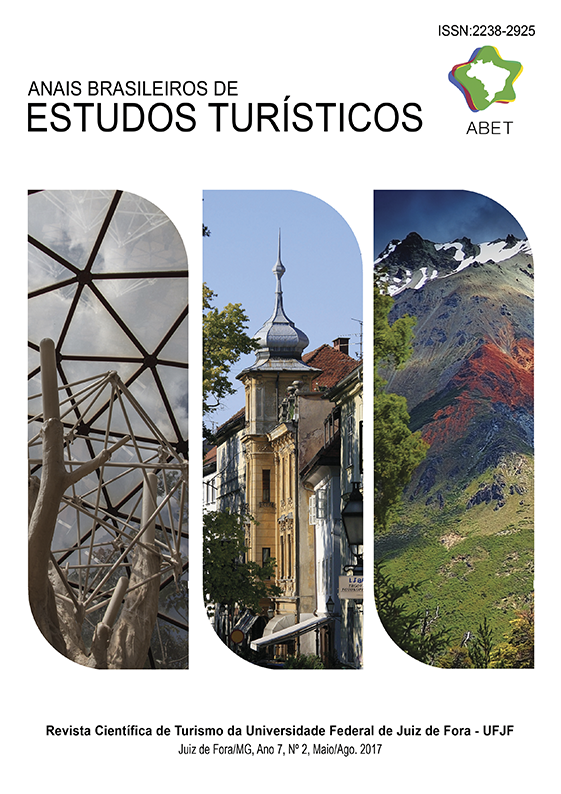Balkan Migration Crisis and its Impact on Tourism
DOI:
https://doi.org/10.34019/2238-2925.2017.v7.3178Palabras clave:
Migration, Tourism, Crisis, BalkanResumen
This paper attempts to quantify, understand and analyse the effect of the migrant flows upon tourism destinations, considering the funnel theory, as a system, focusing on the beginning (inputs), through (throughput) and at the end of the funnel (outputs). Empirically, the research examines three key questions: 1. Importance of tourism economically to countries in the West Balkan Migrant Corridor; 2. Intensive nature of tourism for these countries; 3. Socio-economic consequences of the migrant flows. The crisis and its effects on tourism looks at a funnel that transmits migrants from the Aegean Sea through the West Balkans to North-West Europe. Importantly, the funnel crisis points are in Greece (beginning) and in Germany (end); the intermediate problem areas (Macedonia, Serbia, Croatia, Slovenia) have been in the throughput of the migrants through the funnel. It must also take account of the security situation in Turkey as well as the difficulty of EU member states in assimilating migrants on the route. Based on the results of the research conducted to date, with the sectional sample data from 2014-2017, it is possible to affirm that the migration crisis in West Balkans countries and countries connected to the migrant corridor has impacted only marginally on tourism. However, This problem is socioeconomic yet deeply humanitarian; whilst unfortunate to reduce a deeply disturbing human issue, such an analysis of “people-flows through the funnel” allows an attempt to quantify, understand and analyse the effect of the migrant flows upon tourism destinations.
Descargas
Citas
EUROPEAN COMMISSION. Relocation & settlement Press Release, EU Commission Directorate General for External Relations, Brussel/Bruxelles, June 2017. Accessed: 21.06.17
EUROSTAT. Tourism statistics Statistics of Tourism gross receipts as a % contribution to GDP. European Comission, 2017a. Available at: <http://ec.europa.eu/eurostat/statisticsexplained/index.php/Tourism_statistics>. Accessed: 21.06.17.
EUROSTAT. Tourism statistics. Statistics of Tourism net receipts as a % contribution to GDP. European Comission, 2017b. Available at: <http://ec.europa.eu/eurostat/statisticsexplained/index.php/Tourism_statistics>. Accessed: 21.06.17.
EUROSTAT. Tourism statistics. Statistics of Tourism nonresident nights spent at tourism establishments. European Comission, 2017c. Available at: <http://ec.europa.eu/eurostat/statisticsexplained/index.php/Tourism_statistics_-_nights_spent_at_tourist_accommodation_establishments >. Accessed: 21.06.17.
EUROSTAT. Tourism statistics. Estimates of tourist labour force as % of non-financial businesses in 2016. European Comission, 2017d. Available at: <http://ec.europa.eu/eurostat/statisticsexplained/images/6/61/Number_of_persons_employe d%2C_by_economic_activity%2C_2013.png >. Accessed: 21.06.17.
FRONTEX Risk Analysis Unit, 2017. 16.05.17 Press release: http://frontex.europa.eu/news/arrival-ofmigrants-in-april-italy-higher-than-year-ago-numbersin-greece-drop-4MeK0Z. Accessed: 21.06.17
FRONTEX Risk Analysis Unit. West Balkans Quarterly, Q3 2016, EU Border & Coastguard Agency, Warsaw, March 2017 (ISSN 2443-8367). Accessed: 21.06.17
FRONTEX Risk Analysis Unit (2017). West Balkans Quarterly, Q3, 2016.
EU BORDER & COASTGUARD AGENCY, Warsaw, March 2017 (ISSN 2443-8367). Accessed: 21.06.17
HALL, C. M. Crisis events in tourism: Subjects of crisis in tourism. Current Issues in Tourism, 13(5), 401-417, 2010.
LILYANOVA, V. The Western Balkans – Frontline of the migrant crisis, European Parliamentary research Service-EPRS, EU Parliament, Brussels, 2016.
PARKERS, R. EU and the Geopolitics of Migration, Ulpaper, Swedish Institute Of International Affairs,| Issue 1, 2015.
RITCHIE, B. W. Chaos, crises and disasters: a strategic approach to crisis management in the tourism industry. Tourism Management, 25(6), 669-683, 2004.
SIMPSON, J.J, SIMPSON, P.M, CRUZ-MILAN, 0. Attitude, towards immigrants and security: Effects on destination-loyal tourists, Tourism Management 57, 373-386, 2016.
WANG, J.; RITCHIE, B. W. Understanding accommodation managers' crisis planning intention: An application of the theory of planned behaviour. Tourism Management, 33(5), 1057-1067, 2012
Descargas
Publicado
Cómo citar
Número
Sección
Licencia
This journal provides immediate open access to its content, following the principle that providing free scientific knowledge to the public provides greater democratization of world knowledge.
Authors must agree to the following terms relating to copyrights:
(a) Authors keep all copyright and grant the to the journal the right of first publication, with the work simultaneously licensed under the Creative Commons Attribution License that allowing job sharing with recognition of authorship of the work and initial publication in this journal.
(b) Authors are allowed to assume additional contracts separately, for non-exclusive distribution of the version of the work published in this journal (e.g. publish in institutional repository or book chapter), with recognition of authorship and initial publication in this magazine.
(c) Authors are allowed and are encouraged to publish and distribute their work online (e.g. in institutional repositories or on your personal page) since they do not do this before or during the editorial process, as this can generate productive interchange, as well as increase the impact and citation of work aired. (See Effect of Free Access).















